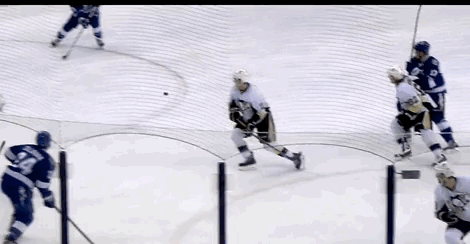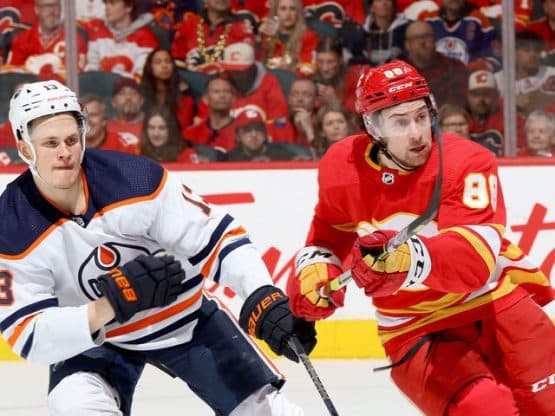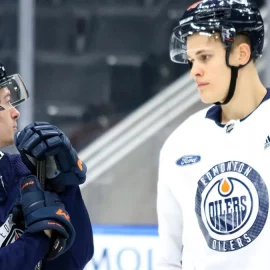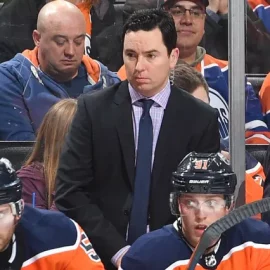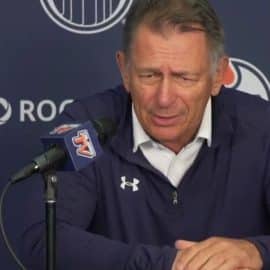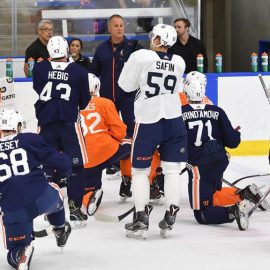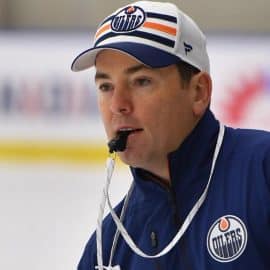This is a collection of a few stray thoughts collected into a series I’ve labelled Deeper Issues.
Get Ready For Shot-Blocking Diatribes!
As we enter the playoffs we’re going to start hearing more and more about shot blocking.
The dictum on blocking shots was written years ago by Kent Wilson when he said blocking shots was like killing rats, it’s better to do it than not, but if you’re doing it all the time then something else is wrong.
The typical debate, if we can reasonably describe as having that sort of decorum, surrounding blocking shots is that it is either the pinnacle of defensive self-sacrifice or a futile gesture that signals all other, preferable options failed or were ignored.
The truth probably falls somewhere between that.
My own sentiment is echoed by what Kent says above. I’m not against blocking shots, it’s a hell of a gutsy thing to do and the difference between blocking a shot and the more analytically-friendly term of taking away the lane depends on whether the guy you’re covering decides to hammer it or pass it off. That’s not really the fault of the guy lining up in the path of the puck.
So is blocking shots good or bad?
Like most things, it is neither but depends on how it is being deployed.
Let me explain another way.
If I said a cure for a disease was some good, old-fashioned blood-letting you’d probably imagine that I’m some sort of neanderthalic quack whose idea of health and medicine hadn’t advanced in 500 years.
But today blood-letting is used to treat several physical ailments by trained, fully accredited modern doctors.
Why?
The techniques and principle of removing blood isn’t either good or bad. It was why they did it and how it was done that were wrong-headed before and are more ideologically sound today.
Physicians used to do it to balance the humours, removing what they believed was poisoned ichor causing some illnesses.
Modern blood-letting takes the form of a phlebotomy, where blood is drained off someone who could be suffering from high-blood pressure and for whom medications are having only a limited beneficial effect. So if the drugs aren’t getting the job done well enough, they’ll pull into a clinic and drain off a pint.
What’s the difference? Empirical evidence that proves that the former is incorrect while the latter is an effective, if somewhat extreme, procedure for a particular illness.
So how does this relate to shot-blocking?
If a player immediately defaults to blocking a shot ahead of several other possible defensive options, and if that player finds themselves relying on that maneuver more often than any other player on his team, it suggests that there is a fundamental aspect of that player’s game that is lacking and needs to be addressed.
There are good shot blocks and bad shot blocks.
A good shot block is one that does not take a player off his feet without a teammate in position to support him while he gets back up. It is designed primarily to deny a passing or shooting lane and not to block the goalie or become more of a screen. It reduces the chances of a deflection on net rather than increases them.
Bad shot blocks are none of those. They are the ones that contribute to confusion rather than help quell an offensive chance until puck control can be regained.
So when you are watching the games this spring and the announcers begin to wax poetic about shot blocking and making sacrifices in the post-season, keep in mind that some sacrifices have purpose and benefit and some are simply sacrifices.
Todd McLellan and The Curse of Connor
Todd McLellan has taken a sad sack excuse for a team and gotten them all the way to the top of the Pacific Division and into the mix of the best teams in the Western conference.
Peter Chiarelli has cut deeply and decisively into the heart of the Oilers’ roster and made dramatic improvements to a team that lost a decade at sea.
Surely both men deserve some credit for that.
No, because nobody gets any credit on a team with Connor McDavid. Many people outside the city see McDavid and immediately downplay any actions or accomplishments as merely being the result of the blind luck the Oilers had in acquiring this messianic player.
Is it correct? No. Is it fair? Certainly not.
Almost forty years ago when the Oilers came into the NHL the league didn’t take any of the old WHA teams that seriously. They punished them, certainly, but they didn’t really fear any of them. Case in point: Wayne Gretzky.
Most people in the NHL thought Gretzky was too small, too slow, to different to be any real threat to the NHL players. They crush him, break him in two. His finesse passing game was no match for hardened, experienced NHL defensemen who’d played with and against the likes of Phil Esposito, Bobby Clarke, Maurice Richard and so many others.
And when Gretzky and the Oilers came into the league, those perceptions were challenged. They didn’t all change. That the Oilers didn’t win a cup in their first three seasons led some vocal personalities to suggest that the Oilers would never win with Gretzky there. He wasn’t tough enough, didn’t play the game the way it was supposed to be played (they were referring to the 70s Bruins and Flyers).
Then the Oilers won a Stanley Cup. And then they won another. Suddenly Gretzky was the Great One, but Glen Sather was also a fantastic head coach and a genius for the way he took this group and formed it into the most feared team in the game.
That won’t apply to Chiarelli or McLellan today. Because the league has seen McDavid coming from a mile away. Everybody has known what this young man can do, though even the most optimistic predictions are beginning to look a little average now.
You are seeing it already, when discussions come up about McLellan in the running for the Jack Adams trophy, which I believe he deserves to be included in discussion though perhaps not as a favourite, it is being dismissed out of hand because “you don’t reward someone just because they can tap Connor McDavid on the shoulder for 28 minutes a night”.
The same holds true for Peter Chiarelli. Despite making massive changes to the roster and now, in a season where those players are all healthy and more changes were effected they find themselves in a commanding playoff position, observers and fans discount his moves because “you don’t reward him just because the lottery balls let him call out Connor McDavid at the draft podium”.
This isn’t to say that I really care, to be honest. I’ve never felt that the award system is entirely accurate or objective, and there have been as many deserving winners as deserving losers over the years. But it does hint that when the Connor McDavid era comes to an end in Edmonton, the contributions of many good people are likely to be overlooked by those outside our market as a result. Let’s do our part to remember them.
Are the Oilers Establishing A New Template?
When the Oilers were beginning their rebuild (the one in 2009-2010), the general concensus was that they were going to struggle because they needed to get bigger, not just faster. This led them to add players like Mark Fistric, Steve McIntyre, Luke Gazdic and others. The Los Angeles Kings set the template that other Pacific division teams appeared to have to follow.
The Kings have set a new course now that they have let go of Darryl Sutter and Dean Lombardi. It will take them a little while to turn that franchise around and discard the non-functioning members of that roster.
The Ducks and Sharks were a part of that California trend of Big Players with the likes of Getzlaf, Thornton, Burns and others.
The Sharks are entering a period of decline now, though they are still a ways away from being a non-factor. The Ducks appear to be able to continue to compete in the Pacific division, though perhaps not dominate as much as in years past.
I believe it is fair to say, without too much bias, that the Oilers are trending to become the dominant Pacific division team.
They are doing this by way of solid goaltending, which never goes out of style, size mixed with skill, something all three California teams have boasted for well over a decade, and speed.
Teams are going to begin to chase the Oilers and we will hear GMs talk about replicating hockey teams “the Oilers way” adding the caveat that obviously they can’t replicate Connor McDavid (although, let’s not sell Jim Benning short, he thought Philip Larsen would fix their defense and powerplay).
I began to think about how teams might try to deal with the Oilers, and more specifically McDavid. I’d be willing to bet the Flames’ approach under Brian Burke will be to add size and toughness. He will focus on players like Lucic and Maroon and look to find facsimiles or upgrades on those kinds of players for the Flames.
Back in the 80s Cliff Fletcher knew he could never match Gretzky, so instead he focused on matching Anderson, Messier, Fuhr, Coffey and others. For Gretzky and the rest of the group, they went in a different direction, bringing in players like Neil Sheehy.
Matthew Tkachuk will be their Sheehy. It remains to be seen how the Flames fill out the rest of their roster as they enter a stage where chasing the Oilers may become a perennial strategy.
The Flames are faced with several key decisions this off-season including extending GM Brad Treliving or letting him walk, re-signing Brian Elliott or finding another goaltender, sorting through a dog’s breakfast of a defensive corps depth and figuring out how to reclaim Sam Bennett, to name a few.
While they are doing that soul-searching, the Canucks are wandering through whatever wasteland they’ve self-exiled to, the Kings re-imagine themselves in a flat-cap world under a new GM, the Sharks move another year closer to rebuilding and the Golden Knights enter the league, the Oilers are poised to take a commanding position in the division. Chiarelli cannot rest this off-season, but needs to address roster imbalances on the wings and bolster a flagging 3rd line.
Add The Sports Daily to your Google News Feed!
